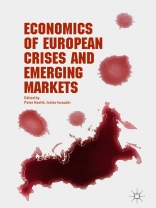This volume explores a wide range of case studies, analyses, histories, and polemics on the fate of post-socialist Europe- and why that matters to readers today. Nearly 30 years after the fall of the Berlin Wall, the post-socialist economies of the former East remain adrift, buffeted by the international financial crisis, the Ukraine crisis, and the ongoing instability in the European Union. This new book brings together a diverse range of scholars in offering a comprehensive look at the struggles faced by policymakers, economists and business people across the former East, and the ways that they responded to crisis. This volume also will be of great value to policymakers, academics, historians, and economists seeking to understand possible influence of China’s One Belt One Road policy on Eastern Europe and Russia.
สารบัญ
1. Macroeconomic Impacts of the Crisis on European Emerging Markets.- 2. The Financial Effects of the Crisis in European Emerging Markets.- 3. Effects of the Global Economic Crisis on FDI Inflow in Eastern European Economies: A Panel Data Analysis.- 4. Employment in the Czech Republic: Trends during Economic Transition and the Global Recession.- 5. FDI and Ownership in Czech Firms: Pre- and Post-crisis Efficiency.- 6. Impacts of the Crisis on the FDI-led Development Model in Hungary: Emergence of Economic Patriotism or Shift from the Competition State to Patronage?.- 7. Impact of Global Companies’ Real Options Implementation on Their Hungarian Subsidiaries.- 8. Potential Macroeconomic Effects of the Trade Collapse due to Economic and Political Crises: The Case of Poland.- 9. Upstreamness of Employment and Global Financial Crisis in Poland: The Role of Position in the Global Value Chains.- 10. Political Response to the Crisis: The Case of Russia.- 11. The Impact of Crisis on Firm Creation and Regeneration in Russia: Regional Panel Data Analysis.- 12. Conclusions: Crisis Left Deep Scars on European Emerging Markets.
เกี่ยวกับผู้แต่ง
Peter Havlik is Senior Economist and former Deputy Director at the Vienna Institute for International Economic Studies (wiiw) and guest research scholar at the International Institute for Applied Systems Analysis (IIASA).
Ichiro Iwasaki, formerly a diplomat at Japan’s embassy in the Soviet Union during the time it transitioned to the Russian federation, researches post-socialist transition economies at Hitotsubashi University’s Research Division of Comparative and World Economics, and has published in Japanese, Russian, and English in a wide range of academic journals.












